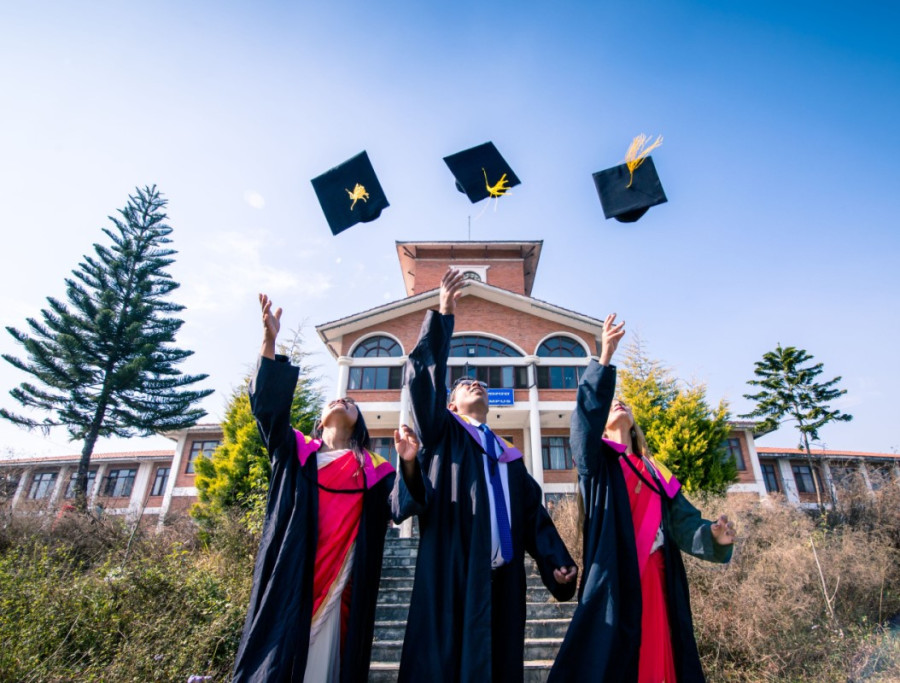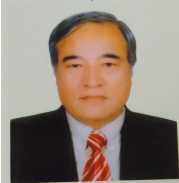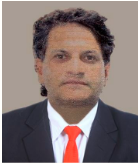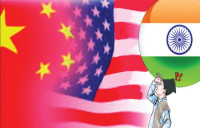Columns
On the right track
People have realised the urgency of steering Tribhuvan University in the right direction.
Hira Bahadur Maharjan & Dhurba Bahadur Karki
The Times Higher Education World University Rankings ranked Tribhuvan University (TU) as the world’s largest, based on the number of students this year. Currently, with 4,60,632 students, the institution has been ranked 801 out of 1,600 universities across 99 countries and territories. The university's ranking not only inculcates in stakeholders the awareness of the current status of the country’s largest university with 1,100 campuses, but also reminds everyone of the relevance of working jointly in the true spirit of sportsmanship.
The news of the TU’s ranking should provide an added impetus to the concerned individuals, including the staff and faculty, students and parents, alumni and reformers. Former Vice Chancellor Tirthraj Khania initiated the ranking process for higher education, which continued after his tenure, sparking vibrations among the stakeholders. The faculty’s publications, research works, results and placements, among others, contributed to the ranking upsurge.
Enrollment and activities
Nepal’s oldest public institution for higher education, TU, manages graduate and undergraduate level programmes in four faculties and five institutes with 7,966 teaching faculty and 7,230 support staff. The university operates four research centres to reinforce teaching, training and research. The semester system, followed by the four-year undergraduate degree programmes, brings students and instructors together in a broad realm of learning through live interactions. The students work closely with the faculty, visit the library, and explore materials, accelerating their competence and performance. It has paved the way for students to engage in research and investigation, get published, and access avenues for career prospects.
TU's engineering and medical science programmes have a high recognition worldwide and they are the top choices of students and parents in Nepal. Students have chosen TU for their Law and Management degrees in recent years. Education, Humanities and Social Sciences each have their own values. Moreover, BCA and BSc CSIT have been popular among students.
The Tribhuvan University Information & Public Relations Division kept track of the graduation records of 11,786 doctors and 1,564 engineers in the academic session 2077/78. Similarly, graduates with bachelor’s degrees record 4,042 in Agriculture and Animal Science; 15,722 in Science and Technology; 17,930 in Law; 35,464 in Management; 11,921 in Education; and 17,460 in Humanities and Social Sciences. Furthermore, 155 doctoral degree awardees include 58 in technical and 97 in general vocation. An ever-increasing trend of enrollment and graduation has been a remarkable indicator of TU’s reputation. Moreover, the university is still the first choice of students and graduates who could be seen in universities and civil services, military and police, technical and non-technical fields, both at home and abroad. Many TU products have served as Vice Chancellors of universities, heads of institutions, political leaders, top-level executives in financial institutions, and also as entrepreneurs and promoters.
The open and distance education centre (ODEC) was established in 2015 in order to offer students opportunities to pursue higher education from different parts of Nepal and the world. Moreover, students from one part of the country could benefit from the expertise of professors and instructors from another part, thanks to ODEC. Eventually, the university could continue its academic sessions online during the Covid-19 pandemic. These days, the faculty and students are accustomed to meeting virtually. The virtual teaching-learning mode has become more popular after the recent global pandemic.
Way forward
Despite its seven decades of history, TU has faced hurdles on multiple fronts, specifically after the restoration of democracy in 1990. People do have a high level of trust in the university staff and faculty and its graduates given their skills and innovations in their respective fields. However, many stakeholders, alumni, and leaders express their concerns about the unwanted political interference in the university education system and its daily operations. Amid adverse circumstances globally, TU and security institutions, including the Nepali Army, Nepal Police, and Armed Police Force, have supported each other in the best interests of Nepal and global communities.
There have been demonstrations urging Prime Minister Sher Bahadur Deuba to ameliorate his alma mater: Tri Chandra College and TU. People have realised the urgency of taking the university in the right direction, with a shared goal of transforming the institution into a centre of excellence. People are equally concerned about the university’s overall management, human resources, and political engagements. Remarkably, some universities have made tremendous progress within just a few decades. TU might have missed golden opportunities.
At this point, we are highlighting the strengths and outstanding accomplishments of TU in the fast-changing global geopolitical dynamics. Recently, at one interaction programme with the media, Vice Chancellor Dr Dharma Kanta Baskota not only shared grievances of unprofessional activities at the university with everyone, but also requested the government to provide his team with Public Safety Officers (PSO). At that point, he urged the concerned authorities to reconcile their differences within the university, through dialogue. Nepal is a small developing country with a short history of democratic practice, and we must work harder to upgrade our university’s education system.




 16.4°C Kathmandu
16.4°C Kathmandu
















